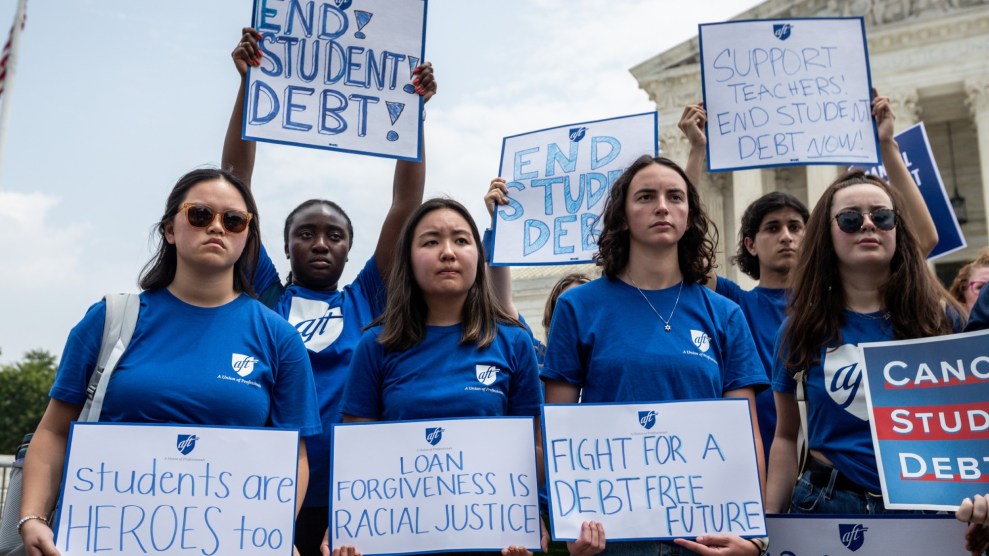
Allison Bailey/Zumapress
Last summer, the Supreme Court struck down the Biden administration’s plan to wipe out more than $400 billion in student loans for about 40 million Americans. The plan would have canceled up to $10,000 in debt for low- and middle-income borrowers, and double that amount for borrowers from the poorest backgrounds. The decision responded to two cases brought by conservative groups, and came down months before loan payments were set to restart after a historic halt during the pandemic—dealing a double blow to millions of borrowers.
Now, 11 Republican-led states are at it again, with a new lawsuit aimed at killing the administration’s latest effort to lower the burden of student debt on households. On Thursday, they sued the Biden administration to undo a new income-driven repayment plan, launched in August to lower required loan payments for many borrowers.
The plan in question—called the Saving on a Valuable Education (SAVE) plan—changes the formula used to calculate monthly payments, basing it on income and family size instead of just a borrower’s loan balance. The result is that for many borrowers, monthly payments are reduced. Crucially, if borrowers keep up with their required payments, any interest beyond that covered by their monthly payment stops accruing on their debt load—and after somewhere between 10 and 25 years, depending on the original loan balance, the remainder of their debt is then forgiven. Since launching less than a year ago, the only people who have had their debt forgiven through SAVE are about 150,000 borrowers who originally took out less than $12,000 in debt and have made payments on their balance for at least 10 years.
In other words, this is an income-driven plan that requires decades of payment from most borrowers—a far cry from simple debt cancellation. But it is a financial lifeline for households drowning under large monthly loan payments after years of high inflation. Yet these 11 states argue that just like the old effort to cancel student debt, Biden’s SAVE plan reaches beyond his presidential authority, recreating the argument against debt relief that won at the Supreme Court last year.
“This is an administration that rules by will, not law,” wrote Kansas attorney general Kris Kobach in the lawsuit. “Although this round of unilateral debt nullification takes on a new name, with a different putative authority, it is every bit as improper as his first unlawful attempt at debt forgiveness.”
On Saturday, Kobach spoke to Fox News about the lawsuit and erroneously claimed that the SAVE plan is a form of wealth transfer from those who are low-income to those who earn more—ignoring the fact that the SAVE plan factors income into monthly payments, meaning those who earn very high salaries would see little benefit.
The case was filed in federal trial court in Kansas. If the judge there sides with these 11 states, the case would have to move up through federal appeals court before having a chance to be heard by the U.S. Supreme Court.
In response to the lawsuit, the Education Department said that in the Higher Education Act, Congress gave it the authority to modify the terms of student loans, including through income-driven repayment plans—noting that this is something the department has done in the past. But the lawsuit from Kobach and his fellow state attorneys general shows that they’re intent on making the argument that, in fact, this is debt cancellation masked as loan modification. That seems like a stretch.
















